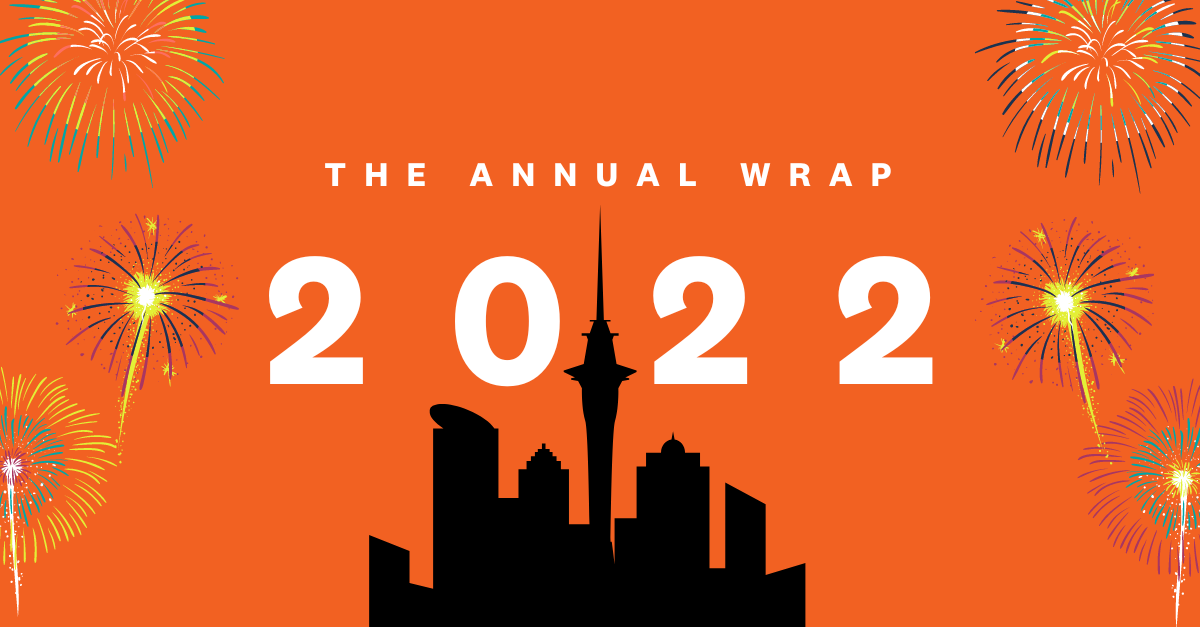Jump to 2022's highlights
A letter from Matt Horrocks, Screen Auckland Manager
What a year. When, five months ago, I slipped into Jasmine Millet’s shoes as head of Screen Auckland, I knew it was a busy role in a thriving industry, but wow. It’s a credit to the dynamism of the sector that there was already much to celebrate before the last border restrictions were lifted in July, and that momentum continues.
This time last year the World’s Biggest Television Production ™ The Lord of the Rings: The Rings of Power had wrapped, leaving a legacy of upskilled crews and providers and the demand for that expertise continues to grow. More than 25 million people watched episode one of the Tolkien prequel on the first day of its release. International reaction means the Screen Auckland team has fielded interest from offshore producers and locations scouts. VFX providers who worked on the show are now extending their reach with the benefit of the capacity building provided by the series.
International productions are a source of growth, but homegrown work is the backbone of the industry. So, raise a glass to Shortland Street, South Pacific Pictures’ weekday drama hit 30 this year and ended with a cliff-hanger that saw its whole premise burning to the ground. The show is far more than a talent incubator, yet there are few within the screen sector who haven’t spent time in Ferndale.
Former Streeters worked on Rūrangi and can now lay claim to a stake in an International Emmy Award for best short-form series. Toi toi also to Sweet Tooth, season one received nine nominations in the first Children’s and Family Emmy Awards, taking out Outstanding Sound Mixing and Sound Editing for a live action programme and Outstanding Supporting Performance in a Preschool, Children’s or Young Teen Programme.
In local accolades, The Panthers, set and produced in Auckland, deservedly took out best drama, and a hatful of other categories in the NZ Television Awards.
Those awards – and the many others that have been bestowed upon Auckland-related productions this year – are evidence of the region’s pre-eminence in the screen sector.
Testimony to the tenacity and resilience of the industry, permit numbers continue to be strong, with several months this year reaching unprecedented growth in applications. Long may that continue.
Screen Auckland is proud to represent the beating heart of the industry, and that includes advocating for screen not only around the world, but also in Aotearoa and Tāmaki Makaurau. In September, we began a 12-month pilot that gives three of Auckland Council’s local boards the power to delegate decision making to staff, reducing the time turnaround for low-impact film applications. It’s working well, and we hope other local boards adopt the new protocols. Additionally, with our friends at Film Auckland we’ve held locations roundtables that will become quarterly in 2023. Collaboration and communication are how we achieve the best possible outcomes for the sector.
Filming at Sites and Places of Significance to Mana Whenua as part of the Unitary Plan needs to be carefully managed to protect those sites and places and their cultural significance, while being a workable option for productions. Screen Auckland undertook ongoing positive engagement with Mana Whenua and affected stakeholders and the year ends with the news that the Auckland Council’s Planning, Environment and Parks Committee endorsed the approach to commence a plan change process, toward making filming a permitted activity on sites and places of significance. This is based on in-principle support by Mana Whenua, with further work to be done on a memorandum of understanding in the new year. This is significant in itself as it has the potential to be a blueprint for other regional film offices in Aotearoa and is a very positive step towards resolution in 2023.
Looking wider, I was fortunate to attend Cineposium 2022, in Colombia. It’s important to be across the latest international trends, and assess how we compare with peers overseas. Overall, Tāmaki Makaurau is doing well however Cineposium reinforced that the industry needs to be more environmentally conscious. In 2021, Screen Auckland commissioned ARUP to produce the New Zealand Screen Sector Emissions Study. The study examines the climate impacts of our sector so that together we can map out the transition to a net zero-carbon future. There’s a lot of work to be done in the new year, when we will release the report, and we intend to bring focus and leadership to the issue.
There is a leadership role for the Auckland to take on this, and other issues, within the national sector. We intend to embrace this in the New Year.
I’d like to thank Jasmine for entrusting me to run Auckland’s regional film office and ensure Screen Auckland strives to make this region a film-friendly destination. Jasmine is now overseeing Tātaki Auckland Unlimited’s creative services offering – including Screen Auckland – and it’s a pleasure to continue to work with her.
I’d also like to thank the Screen Auckland team. Being new to the job, I’ve appreciated their commitment and professionalism through demanding times.
Most of all, I’d like to thank everyone in the Tāmaki Makaurau screen industry for their role in the region’s reputation for being at the top of our game, for taking pride in our work and for having a can-do attitude. We appreciate the calibre of your work.
About Screen Auckland: Screen Auckland is the regional film office for Tāmaki Makaurau Auckland, New Zealand’s largest city and the hub of the country’s film industry. Auckland has earned an international reputation as a filming destination that offers a top-quality, cost-effective and conducive environment for screen production and post-production. A third of the country’s population lives in Auckland, providing an impressive talent pool to draw from and the most extensive range of facilities, while still offering easy access to other locations in the North Island and the rest of New Zealand.
